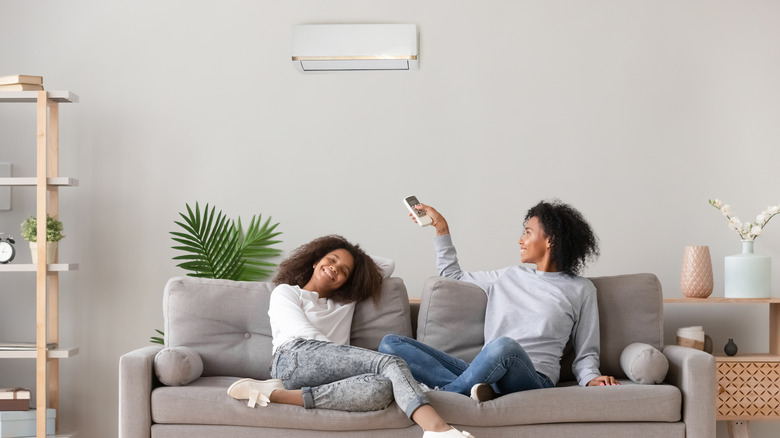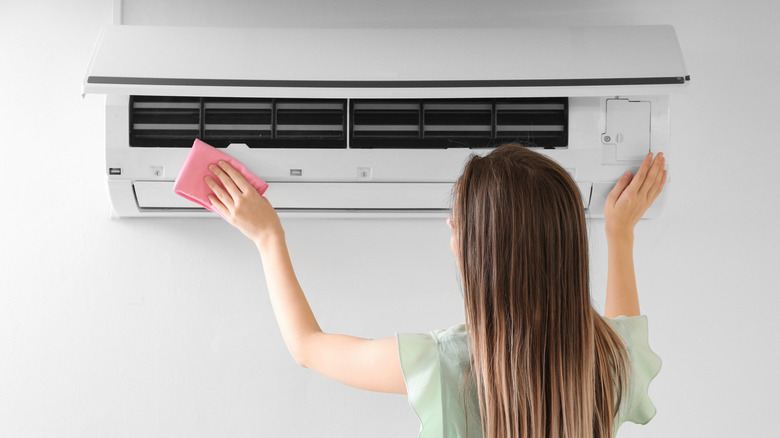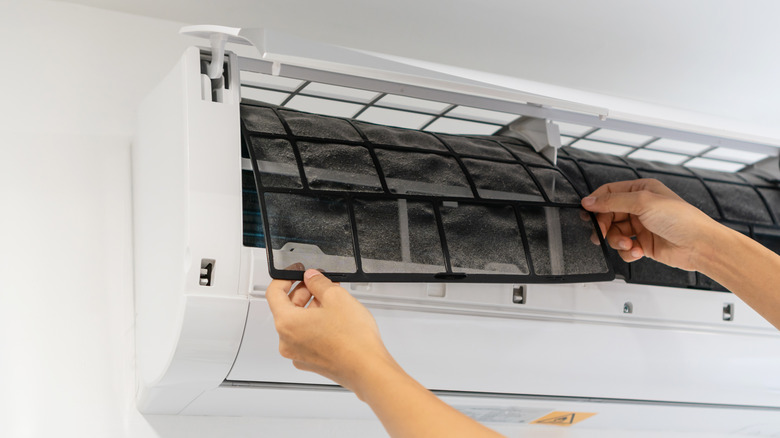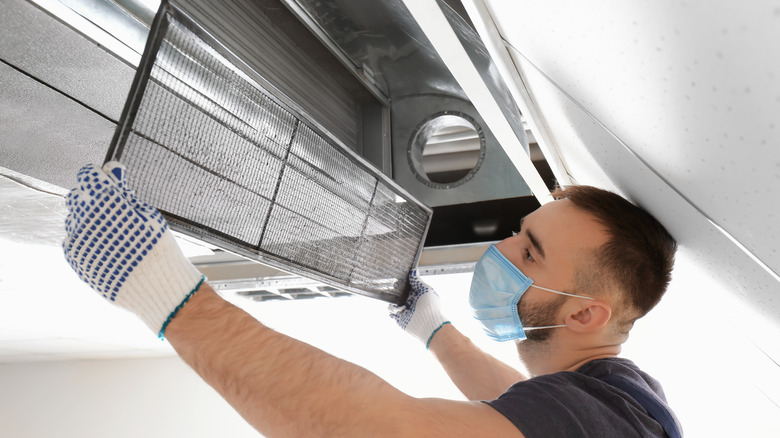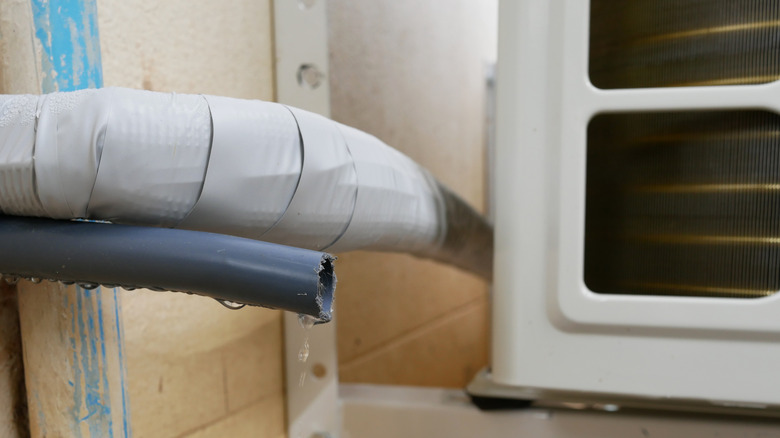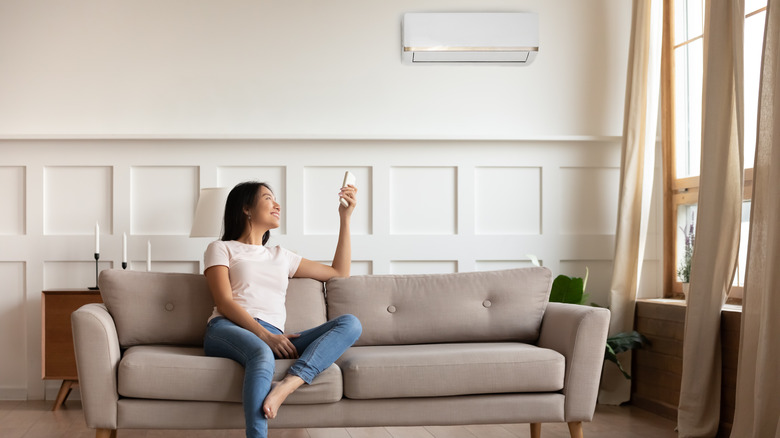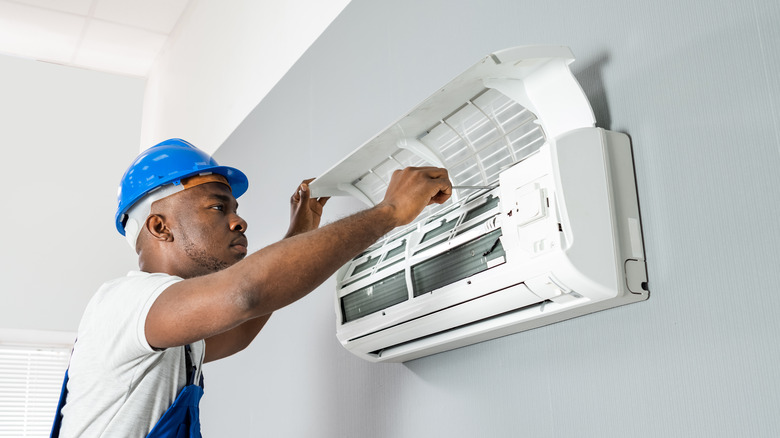Tips On Cleaning An In-House Air Conditioning Unit
Once the warm heat and everyday sunshine arrive, you know it's time to start using your air conditioner for the delightful season of summer. And what's summer without such a useful system in your home to provide that cool relief after being outside in the heat all day? For many people, having an air conditioner in the summer is not an option; it's a necessity. For others even, it's a must all year round. Regardless of either preference, it's important to keep up with the maintenance of your AC unit, including cleaning it regularly.
It's completely normal that, over time, your AC unit would work harder to reach the same level of cooling it once did when you first bought it. Still, the upkeep plays a huge part because dust, particles, and dirt build up inside your air conditioner system over time. According to David Leroy Plumbing, cleaning your AC is crucial for keeping your system healthy and long-lasting. So, if you want your cooling system to provide the best possible airflow quality that you can get, put a few hours of your day aside and follow these simple steps to have it buzzing just as new before.
Open the AC unit
The beauty of having an in-house air conditioner system is that you can save money and maintain it yourself unless it's damaged. Before starting the task, you should ensure that your AC system is completely turned off for your safety. Only open your unit once you've confirmed that the power is off. It's also recommended to schedule this cleaning during the daytime as the system has numerous tiny pieces that can become a nuisance to handle at night.
Real Simple advises that if you're unsure how to open it, it's best to follow your AC manufacturer's directions. Depending on the type of in-house air conditioner, removal will differ for everyone. Still, it's important to keep in mind that cleaning the filter may not be possible — again, depending on the unit type — David Leroy Plumbing says. So check your unit's instruction manual and if you find yourself in this predicant, call a professional to have your filters replaced.
Clean the air filters
The filters on your air conditioner accumulate buildup and get dirty over time, so you must check them every so often as you're using your unit. According to Snell Heating and Air, this is the most crucial step yet the easiest one.
First, remove the filter from the AC system and start by dusting it off; you can do this using a portable vacuum or a soft brush. Once that is done, fill up a large container or bin with lukewarm water to allow the filter to soak. As you place the filter in the water, you want to make sure it's fully immersed. Let it sit for 10 to 15 minutes, and after the filter completely air dries after a couple of hours or so, position it back into the unit. For your AC to run properly and support airflow, you should disinfect the filters often and replace them twice a year.
Clean the coils
Every system is unique, but generally, units have nails to hold the side in a place that leads to the coils. According to Real Simple, the coils on the air conditioner help cold airflow quickly through, so they don't get mixed in with any dirt or particles. To see them inside, open the AC unit. The most effective cleaning solution you can use is a no rinse coil cleaner that can be found at any home improvement store such as Lowe's or Home Depot.
For anyone who wants to take a more natural route and would rather make a solution at home, a spray bottle filled with dish soap or light detergent would do the job. Next, use a small soft brush or cloth to rub away any extra dirt you notice between the coils. The dirt is from particles and dust that have occupied your home. If you're someone who suffers from allergies due to pollen, you should wear a mask when you're doing this to avoid having an allergy attack, David Leroy Plumbing recommends.
Clean the air conditioner drain pan
You should move on to scrubbing the drain pan if it is visible once the coil cleaner has completely set in. Create a mixture of soap, hot water, and bleach by evenly using the same amount of bleach and water. It's essential to keep in mind that the water and soap are more for hygiene while the bleach works as a disinfectant. Also, you want to avoid making the solution very soapy. As you pore the pollution into the drain, it should easily clear the pipe.
David Leroy Plumbing notes that your drain is more than likely clogged if the solution does not and you notice buildup. Furthermore, it's imperative to make cleaning your air conditioner a normal part of your home cleaning routine in the summer; otherwise, mold and algae will cause bacterial growth in the drain over time. This will cause more buildup and can ultimately make you and your household sick, especially if you suffer from severe allergies.
Make sure the air conditioner is working properly
Even though cleaning your air conditioner can be a time-consuming task, it's worth it; you'll thank yourself once you get it done. The final part of the cleaning process is easy. Once you've cleaned your AC unit, re-secure the access door you may have had to remove initially. Next, plug in the system, turn it on, and feel the new and improved airflow taking over your home.
If you notice that your air conditioner isn't turning on or working correctly, it would be good to call in a professional or have it replaced. Sometimes there may be a leak or damage only a professional would notice, and you shouldn't try to fix the unit on your own. According to HGTV, general problems for hiring a professional include your AC system not operating at regular temperatures, restricted airflow in spaces, and mold or odd internal smells.
Keep up with maintenance
It can't be emphasized enough how important it is to keep up with the quality and maintenance of your air conditioner. Remember that nothing in your home should ever be blocking the system. It's a good thing if you've never had any issues with your unit yet, but that doesn't mean they'll never come. Always look for any prevailing problems because there is something you could be missing.
According to Real Simple, some common things you should look for are frail airflow, broken coils, leakages, clogged filters, or any internal damage. If you find that something is wrong with your air conditioner that you cannot fix on your own, call a professional who knows what they're doing to help. Try to get it done as soon as possible. And keep in mind that the more you check, the less likely you are to have any problems with your unit.
